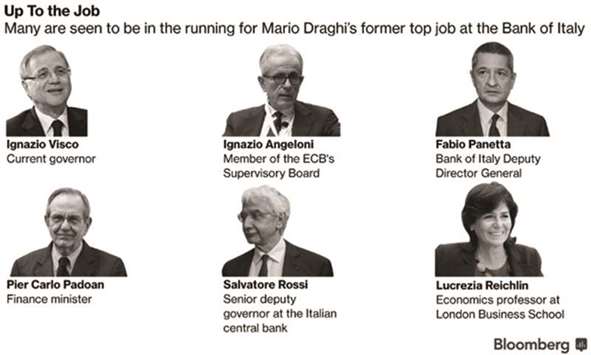Former Premier Matteo Renzi has thrown the choice of governor for the Bank of Italy into disarray with an attack by his ruling party on Ignazio Visco, the current holder of the job who had been widely expected to be given a second term this month.
Lawmakers are blaming the central bank and Visco for mishandling the nation’s bank crises, while Visco has staunchly defended has actions.
Prominent figures who now may be in line to head the Bank of Italy include Salvatore Rossi, currently its senior deputy governor, and Finance Minister Pier Carlo Padoan, according to Italian news media. Rossi appears to be Renzi’s first choice, newspaper Il Sole 24 Ore said yesterday.
Other possible nominees include Ignazio Angeloni, a board member of the European Central Bank’s Single Supervisory Mechanism, and economist Lucrezia Reichlin. Visco’s successors may also include the Italian central bank’s deputy director general, Fabio Panetta, another member of the SSM board, which oversees the region’s largest lenders.
“We’re back to square one, Visco is now weakened,” said Vincenzo Longo, an analyst at IG Markets in Milan. “The nomination increasingly has political connotations because of the Democrats’ move ahead of the national elections due early next year.” Opinion polls show Renzi’s Democratic Party virtually tied with the populist Five Star Movement as well as a possible centre-right alliance including Forza Italia of ex-premier Silvio Berlusconi.
The move to oust Visco comes at a sensitive time for Italy and the euro area. The ECB, where he sits on the Governing Council, is due to meet next week to try and agree on how and when it can wind down its bond-buying programme. ECB support has been critical for reviving the region’s economy but Italy’s recovery was slow to gain traction and remains fragile, partly because of weaknesses in a domestic banking system burdened by bad loans.
The decision on the Bank of Italy governor will resolve one of a number of pending appointments in global finance, not least with Janet Yellen’s future as US Federal Reserve chair in the balance. The BOI role, with a salary of €450,000 ($528,000) a year, carries with it a seat at the Group of Seven table as well as the ECB council position, and the prestige of leading a linchpin of the country’s political furniture in a coveted role that has changed hands only seven times since 1948.
Democrat lawmakers caught Prime Minister Paolo Gentiloni, President Sergio Mattarella and the Bank of Italy itself completely by surprise on Tuesday, according to Italian media, when they effectively targeted Visco with a motion saying the appointee should “guarantee new confidence” in the institution after controversy over its handling of the country’s banking system. The motion was approved by Parliament’s lower house.
“Tell me it’s not true,” a furious Padoan told Gentiloni on the phone, according to the newspaper Corriere della Sera. “I don’t believe it, Paolo, I don’t believe it,” Padoan reportedly added. Spokespersons for Gentiloni and Padoan declined to comment on the exchange.
President Mattarella, who appoints the governor on the recommendation of Gentiloni and his cabinet, may still decide to reappoint Visco, according to an Italian state official who asked not to be named discussing a confidential matter. Political tensions should not be dumped onto the central bank, the official said.
The government has its prerogatives, but so does the president of the republic, the official added, and the two should agree on a choice, otherwise there would be an impasse. Visco’s mandate ends around the end of this month after a six-year term.
Under Visco’s leadership, the Bank of Italy has been accused of failing to supervise the country’s banks adequately before a series of bailouts that shattered market confidence in its financial system.
The Bank of Italy justified its actions. In supervising the banking sector, the central bank always focused on defending the savings of Italian citizens at a time of serious economic difficulties for the country, a Bank official said, declining to be identified in line with internal policy. The Bank had constantly liaised with the government, the official added.
In June the government committed as much as €17bn to wind down Banca Popolare di Vicenza and Veneto Banca and in July it got EU approval to give €5.4bn of aid to recapitalise Banca Monte dei Paschi di Siena.
Visco said he is available to testify before a recently formed Parliament committee investigating Italy’s financial system and provide lawmakers with all relevant documentation, according to the central bank official.

